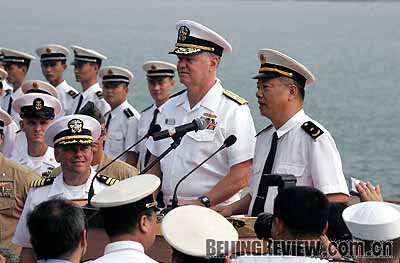| Ever since U.S. President Barack Obama took the oath of office in Washington last month, Chinese foreign affairs experts and the media have raised concerns about the direction the new American leader would take in economic and trade relations with the world's largest developing country.
 |
|
JOINT EXERCISE: Lin Yongqing (right), Vice Chief of Staff of the South China Sea Fleet, welcomes Commander of the U.S. Pacific Fleet Gary Roughead (second right) in Zhanjiang, south China's Guangdong Province, in November 2006, when the Chinese and American navies held a search-and-rescue exercise in the South China Sea (ZHA CHUNMING) | Early on, some expressed caution, especially concerning the two countries' vital trade relations, which have been affected by the global economic crisis.
An editorial in China Daily on January 20 said, "Judging from his previous words, President Obama may see China as a competitor his country will have to deal with. The next question is how." It went on to suggest that Obama continue former President George W. Bush's policy of laying solid ground for Sino-American ties.
But the caution quickly intensified to alarm as details about how the United States might deal with China emerged over the following weeks. Both U.S. Vice President Joe Biden and Treasury Secretary Timothy Geithner criticized China's currency policy. Geithner told the Senate Finance Committee during his confirmation process that Obama had vowed to "use aggressively all the diplomatic avenues open to him to seek changes in China's currency practices." His statements reflected the U.S. Government's long-held belief that China purposely devalues the yuan to keep American exports at a competitive disadvantage against lower-priced Chinese products. Shortly afterward, Biden said the United States would be "blunter with the Chinese" and that China must "play by the rules."
Premier Wen Jiabao immediately defended the country's currency policy and said during a visit to Berlin that the exchange rate of the yuan, also known as the renminbi, should be maintained at a "rational and balanced level." China has allowed the yuan to appreciate 21 percent against the dollar since July 2005, when it was officially depegged from the U.S. currency.
Biden also said the Obama administration had not decided if it would formally accuse China of currency manipulation. The Americans are afraid that China, the country's largest creditor, will stop buying U.S. treasury securities if they push too hard for the country to let the yuan appreciate or go so far as to accuse China of outright currency manipulation. During his European tour in late January and early February, Wen said China's motivation to buy large amounts of treasuries depended on its obligation to safeguard the value of its foreign reserves, according to a Reuters report.
At the World Economic Forum in Davos, Switzerland, on January 28, Wen attributed China's economic woes to U.S.-led financial institutions that he said lacked self-discipline and blindly pursued profit.
As if all this were not enough, a "Buy American" provision in the White House's $790-billion economic stimulus package, which was still making its way through Congress when Beijing Review went to press on February 12, has amplified fears of a possible trade war. The bill would require public construction works to use only U.S. iron and steel, and stimulus-funded projects to use only American products. But on February 3, Obama told American television network Fox that the country could not "send a protectionist message" on trade and that he would consider the language of the "buy American" provision in the bill.
|
